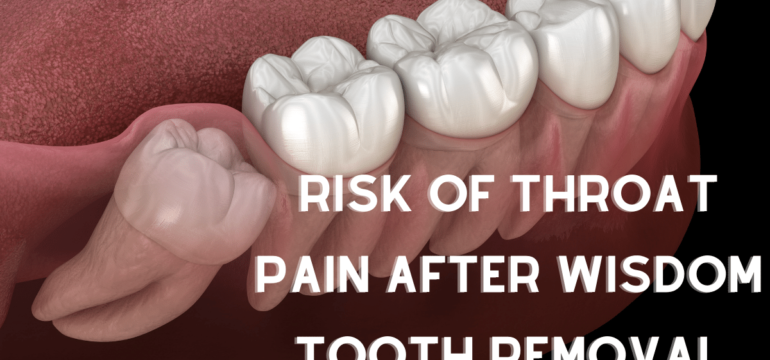A common complication after wisdom tooth removal is pain in the throat. This can be due to a variety of reasons, including infection, damage to nearby nerves, and displacement of dental implants. The good news is that there are ways to reduce the risk of throat pain after wisdom tooth removal. In this article, we’ll discuss the causes and potential solutions to your problem.
Causes of Throat Pain After Wisdom Tooth Removal
There are several potential causes of throat pain after wisdom tooth removal, including nerve damage and infection. In most cases, the pain will dissipate on its own in a few days or weeks. However, if the pain is severe or persists, you may need to see a doctor.
Nerve damage
One potential cause of throat pain after wisdom tooth removal is nerve damage. This can happen as a result of the dentist’s technique (for example, using too much force), the surgery itself, or post-operative inflammation. Nerve damage may cause your jaw to hurt more than usual and make it difficult to eat or drink. If nerve damage is suspected, your dentist may refer you to a neurologist for further evaluation.
Infection
Another possible cause of throat pain after wisdom tooth removal is infection. This can occur either during the surgery itself or later on in the healing process. If infection is suspected, your dentist may prescribe antibiotics to help prevent it from spreading further. Alternatively, hemay recommend CoolSealTM gel therapy which helps reduce swelling and discomfort. If infection does occur, it typically resolves on its own within 2-4 weeks.
Throat pain after wisdom tooth removal is usually temporary and typically goes away on its own in a few days or weeks. If the pain is severe or persistent, see a doctor for evaluation.
Reducing the Risk of Throat Pain After Wisdom Tooth Removal
If you are considering having your wisdom teeth removed, be aware of the risks associated with the surgery. One of the most common complications is throat pain. Here are some tips to reduce the risk of throat pain after wisdom tooth removal:
- Appreciate that your body will experience a range of post-operative sensations, including pain. If discomfort continues beyond this time, speak with your doctor about potential solutions.
- Make sure you gargle and rinse well after surgery. Postoperative sore throats can occur due to bacteria entering the throat via the surgical site or from saliva secretions that accumulate in the mouth following surgery. To reduce these risks, make sure to gargle and rinse well following surgery. Steer clear of salty foods and drinks for at least 24 hours following surgery as they can also increase your chances of developing a sore throat.
- Ice may help relieve pain and swelling following surgery. Apply ice packs to the surgical area several times a day to help reduce swelling and relieve pain. don’t exceed the recommended number of ice packs, as overuse can cause additional damage to your jawbone.“
- Consider taking over-the-counter painkillers before surgery. If you are experiencing significant postoperative pain, consider taking over-the-counter painkillers such as ibuprofen or acetaminophen. However, be aware that these medications may also cause drowsiness and should be avoided if you are driving or operating heavy machinery.
- Drink plenty of fluids before and after surgery. Drinking plenty of fluids before and after surgery can help reduce the risk of developing a sore throat. Try to drink at least eight glasses of water per day before surgery, and continue to drink fluids for two days following surgery.
Prevention Tips for Throat Pain After Wisdom Tooth Removal
Throat pain after wisdom tooth removal is a common occurrence, and there are several things you can do to reduce the risk of it. First, make sure you have an accurate estimate of how many teeth you’ll need to remove. Over-removing teeth can cause pain and difficulty speaking, eating and drinking. Second, avoid biting your tongue or lip when removing your teeth. Doing so can cause nerve damage that results in pain in the jaw and neck. Finally, take ibuprofen before the procedure and drink plenty of fluids afterward to help relieve any pain or swelling.
Conclusion
If you are experiencing pain after having your wisdom teeth removed, there are a few things that you can do to reduce the risk of throat pain. By Above these tips, you will be able to help minimise the chances of developing throat pain and keep your oral health in top shape.




